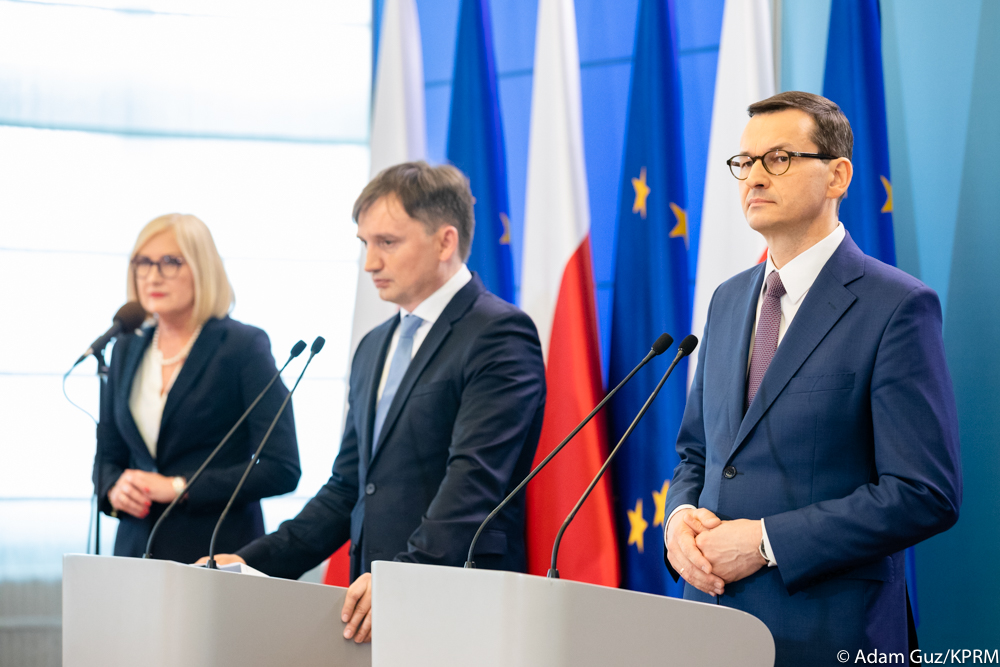Poland’s prime minister and justice minister have responded defiantly to today’s European court ruling ordering the interim closure of a Polish coal mine. Warning that obeying the ruling would threaten the country’s energy security, they described the ruling as “colonial” and to the benefit of Germany.
Earlier this year, the Czech Republic filed a lawsuit against Poland at the Court of Justice of the European Union (CJEU), arguing that the renewal of a licence for the Turów coal mine on the Polish side of their shared border had been issued in violation of EU environmental law. The case is the first of its kind.
Today, in compliance with a Czech request, the CJEU ordered that operations cease at the mine as an interim measure before the court issues a final ruling (which could take years).
“Today’s decision by the CJEU is unprecedented and contrary to the fundamental principles of the functioning of the EU,” wrote the prime minister, Mateusz Morawiecki, in a statement issued by his chancellery. “The measures taken are disproportionate.”
“No CJEU decisions may violate areas related to the basic security of member states,” said Morawiecki, before pointing out that “4-7% of Poland’s electricity production is linked to the Turów mine”. Poland relies on coal for around 70% of its energy, by far the highest proportion in the EU.
“The safety, health and life of millions of Polish citizens…depend on…its stable operation,” he continued. While not explicitly saying whether Poland would comply with the ruling, the prime minister finished by noting that “the Polish government will not take any actions that could harm Poland’s energy security”.
Oświadczenie premiera @MorawieckiM w sprawie decyzji TSUE dotyczącej kopalni Turów.https://t.co/4LI4V4jnjq
— Piotr Müller (@PiotrMuller) May 21, 2021
Meanwhile the justice minister, Zbigniew Ziobro, who is also leader of a hardline eurosceptic junior partner in Poland’s ruling coalition, issued an even more strongly worded statement.
“The entry of the EU bodies more and more deeply into the field of competence of the Polish authorities smacks of colonial spirit and is unacceptable,” he said. He claimed that the closure of the Turów mine would benefit Germany, reports TVP Info.
“That is why we are against expanding the competences of those authorities that do not care for the interests of Poland and Poles, but are guided by the interests of others who will benefit from it,” continued Ziobro, who has often condemned what he claims is growing EU infringement on national sovereignty.
… pokazuje, że unijny trybunał uderza nie tylko w nasze podstawowe interesy gospodarcze, ale też w suwerenność energetyczną, bo suwerenność to też kwestia naszego bezpieczeństwa w obszarze energetycznym. 2/2
— Zbigniew Ziobro | SP (@ZiobroPL) May 21, 2021
“The EU is implementing the ideological agenda of the climate and energy package, regardless of the enormous costs that Polish society has to bear,” said the justice minister, whose United Poland (Solidarna Polska) party has strongly opposed Poland accepting EU climate targets.
“Burdening Poles with costs reaching billions of zloty on the basis of an ill-considered decision of the CJEU shows that the EU tribunal strikes at not only our fundamental economic interests, but also energy ones, because sovereignty is also a matter of our energy security,” he continued.
Meanwhile, PGE, the state-owned power company that runs the Turów mine, responded to today’s ruling with a sarcastic tweet. “CJEU, [here is] another mine located in Germany and owned by a Czech energy company. When is it closing?” wrote the company, noting that the mine in question produces 16 million tonnes of coal a year.
#TSUE, kolejna kopalnia znajdująca się w Niemczech a należąca do czeskiego koncernu energetycznego, #WelzowSüd. Kiedy zamknięcie? Kopalnia wydobywa 1⃣6⃣ mln ton rocznie! 147 km od KWB #Turów! pic.twitter.com/kqkosHsDSf
— PGE Polska Grupa Energetyczna (@Grupa_PGE) May 21, 2021
Main image credit: Adam Guz / KPRM (under public domain)

Daniel Tilles is editor-in-chief of Notes from Poland. He has written on Polish affairs for a wide range of publications, including Foreign Policy, POLITICO Europe, EUobserver and Dziennik Gazeta Prawna.




















